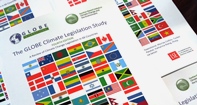Murray Collins

Murray’s PhD is on the quantification and valuation of forest carbon and forest biodiversity. The research draws on both the social and natural sciences and is funded by the NERC-ESRC. He is hosted at the London School of Economics and Political Science and the Zoological Society of London.
Murray is supervised by Susana Mourato, Marcus Rowcliffe and Chris Carbone.
Background
Murray studied for a BSc in Anthropology and Geography at University College London and La Sorbonne (Paris V, Rene Déscartes; ‘Mention Excellent’). He has an MSc from Imperial College London in Conservation Science (Distinction).
Murray has most recently worked on the economics team of the UK National Ecosystem Assessment, and for the Grantham Research Institute, producing the 3rd GLOBE review of climate change legislation.
Prior to PhD research, he worked for the government of Gabon, undertaking research on forest carbon stocks, to help the country build its position in UNFCCC discussions over a potential international REDD+ mechanism. He has also worked in Indonesia, as a field researcher, placing camera traps for National Geographic. In addition, Murray made a natural history mystery film with Banyak Productions about a primate said to live in the mountain rainforests of Sumatra.
Research interests
- Quantification and valuation of ecosystem services;
- Payments for ecosystem services;
- Institutional aspects of environmental policy implementation;
- Tropical forests, carbon emissions and biodiversity conservation;
- Remote sensing of the environment.
Research
Research - 2015
This paper reviews the main domestic factors that drive legislation on climate change. Read more

The number of climate change laws in major economies has grown from less than 40 in 1997 to almost 500 at the end of 2013. The passage of these laws is influenced by both domestic and international factors. This paper reviews the main international factors, drawing on a powerful new dataset of climate legislation in 66 national jurisdictions. We find that the propensity to legislate on climate change is heavily influenced by the passage of similar laws elsewhere, suggesting a strong and so far under-appreciated role for international policy diffusion. Read more

Research - 2014
Working Paper 156 Abstract This paper analyses national and international factors that drive the adoption of legislation on climate change.... Read more

A review of climate change legislation in 66 Countries Michal Nachmany, Sam Fankhauser, Terry Townshend, Murray Collins, Tucker Landesman, Adam... Read more

Research - 2013
Abstract Large trees (d.b.h. ≥ 70 cm) store large amounts of biomass. Several studies suggest that large trees may be vulnerable to changing... Read more

Reference Townshend, T., Fankhauser, S., Aybar, R., Collins, M., Landesman, T., Nachmany, M., and Pavese, C. April 2013. How national legislation can... Read more

Research - 2011
Abstract Climate change threatens ecosystems and human society, with tropical deforestation contributing a fifth of anthropogenic carbon emissions. The proposed... Read more

Abstract Discussions on how to reduce carbon emissions from deforestation and degradation have prompted scrutiny of methods for measuring rates... Read more

Reference Collins, M. (contributing author), et al. June 2011. Chapter 22: Economic values from ecosystems. The UK National Ecosystem Assessment. Read more

Abstract The eruption of the Eyjafjallajökull volcano starting on 14 April 2010 resulted in the spreading of volcanic ash over... Read more

Policy
Policy - 2014
Note: New and updated 2015 edition available The GLOBE Climate Legislation Study is the most comprehensive audit of climate legislation... Read more

A review of climate change legislation in 66 Countries Michal Nachmany, Sam Fankhauser, Terry Townshend, Murray Collins, Tucker Landesman, Adam... Read more

Events
News
News - 2011
Staff, students and members of the Grantham Research Institute on Climate Change and the Environment have contributed to this report, which provides an analysis of the UK's natural environment in terms of the benefits it provides to society and continuing economic prosperity. Read more

